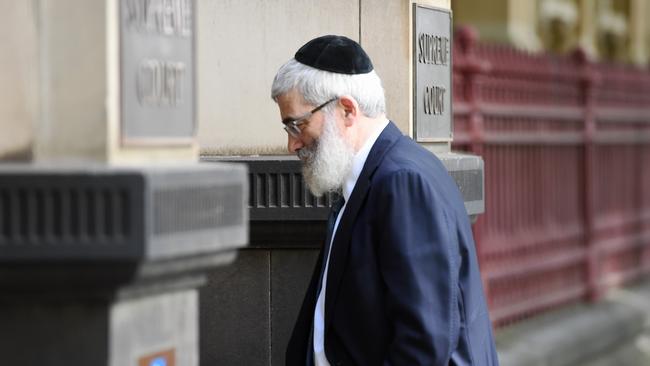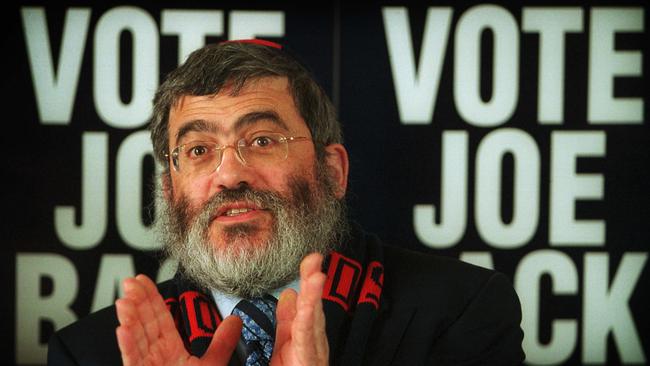Rise and fall of Diamond Joe Gutnick: career ends in bankruptcy
The businessman’s colourful career has ended in disaster with debts of $275m.

In Australia’s courts, the man they call Diamond Joe is a frequent flyer.
He once even sued his sister and brother-in-law — and won.
But in the Indian Farmers Fertiliser Cooperative, Joe Gutnick may have met his match.
Since May last year Gutnick’s legal battle with the world’s largest fertiliser co-op, over a 2008 deal gone wrong, has spiralled out of control, resulting in the collapse of his Legend International empire and, last Friday, personal bankruptcy with debts of $275 million.
It has been a heavy fall for the 64-year-old Gutnick, who only two years ago was valued at $250m — the legacy of a career filled with triumphs and failures that spans the roaring 80s boom, a stint as president of perennially struggling AFL club Melbourne and a relentless hunt for the diamonds that gave him his nickname.
Also hit hard is the orthodox Jewish Chabad community. New York religious organisation Machne Israel is owed $13m. A whopping $33m is also owed to New Yorker Nachum Sternberg, who appears to be a rabbi — as is Gutnick.
Gutnick was born in Sydney of a Ukrainian father and Polish mother, and moved to Melbourne when he was a child. He was one of six children, an ultra-Orthodox Jew and a member of the New York sect known as the Lubavitch.
He went to New York as a young man to do four years of rabbinical studies, but unlike his brothers he ended up following a commercial career.
By the early 1980s Gutnick is said to have been in control of a stable of 20 exploration companies, with a passion for the sector fired up by the 1969 Poseidon nickel boom. He has said he was drawn to a sector where $1m can become $100m.
The ability of exploration company share prices within the Gutnick stable to post sharp price moves had some in the market dubbing him “Joe Sputnik’’. It was not the last nickname bestowed on him.
Come the 1987 crash and Joe Sputnik came tumbling back to earth. He was just about bust after the crash, with its savage sell-off in all equities — but particularly the highly speculative exploration end of the mining game. Still, with the loyal support of his followers he managed to survive and went on to see his Great Central Mines discover the Plutonic gold deposit in WA in 1988. But the hangover from crash prompted its sale for $50m to keep the stable afloat.
About a year after the crash, Gutnick’s religious leader and close friend, the Rebbe Menachem Schneerson, made a prophecy that Gutnick would have success in discovering gold and diamonds beneath the sands of WA, and that he would soon become wealthy.
It was around that time he became known as Diamond Joe.
His survival ability was again put to the test in 1990 when one of his companies, Centaur Mining, went in to receivership owing more than $70m to the failed merchant bank Tricontinental. Gutnick persuaded NatWest Australia to back him in a refinancing to be paid for with gold production, and Centaur eventually relisted.
In the following year Gutnick was back in the headlines when his Great Central Mines made WA’s Mark Creasy the richest prospector on the planet, paying him $135m for his Yandal gold belt interests, home to the Bronzewing and Jundee gold deposits.
The gold was good, but it was the sniff of a big diamond discovery in an exploration joint venture with the mighty De Beers that was to put a rocket under the value of Great Central. It soared to more than $1bn in 1993, and Gutnick’s stake in his stable of companies was said to be worth $500m — for a time at least.
Controversy was never far away, even if Gutnick was just a bystander. A hot nickel discovery in 1995 by an unlisted company sent shares in Gutnick’s ASX-listed Mount Kersey soaring, because it held the ground next door.
Suspect trading in Mt Kersey lead to an insider trading case (not involving Gutnick) which swung on what constituted a public announcement by an unlisted private company. The case went nowhere but the whole saga led to a bombshell three years later when dealing room tapes from establishment broker JB Were containing anti-Semitic remarks about Gutnick and the Jewish community became public.
Most remarkably in a remarkable career, Gutnick’s mining success was to bankroll his challenge in 1996 to become president of the most establishment of the AFL clubs, the Melbourne Demons.
The Demons were under pressure to merge with Hawthorn and its members voted in support. But Hawthorn members said no, clearing the way for Gutnick with his no-merger ticket to win the day. His $5m in bailout funding helped.
Orthodoxy means he never attends a Friday night or Saturday game, but he has donned a red and blue yarmulke in support. The following year Gutnick’s success was rewarded with his award of the Digger & Dealers forum’s inaugural “Digger” of the year award. Gutnick’s commitment to Kalgoorlie was demonstrated through his purchase of a $500,000 house near the airport. Locals said he paid $100,000 too much.
In terms of the mining game, it was the peak year for Gutnick. Weak gold prices prompted a decision to partner with Australia’s biggest gold producer, Robert Champion de Crespigny’s Normandy. It was a stepping stone to a full takeover a few years later.
Come 2001, Gutnick’s presidency of Melbourne Football Club came to an abrupt end when he resigned minutes before the club’s directors moved to depose him. And Centaur collapsed, owing creditors $700m, after its Cawse nickel project proved to be a flop.
An ASIC investigation into insolvent trading that took 14 months to complete came to nothing. But Gutnick is still said not to be welcome in Kalgoorlie.

In more recent years Gutnick has kept a lower profile in Australia, concentrating on his US-domiciled Legend and at one point quitting the country in favour of residence in tax haven Singapore. But with such a turbulent career behind him, sifting through the wreckage will keep Gutnick’s trustees in bankruptcy, Andrew Yeo and Gess Rambaldi, and Legend’s liquidators, Mark Korda and Craig Shepard, busy for months or years.
The newly broke Gutnick has declared he owes members of his family about $130m, $30m of which is due to his wife.
If family members are allowed to vote in the amounts declared by Gutnick, they may be able to control a meeting of creditors to be held in a month. They might be more sympathetic to him than IFFCO, which is aggressively pursuing a combined $79m it is owed by the fallen mogul and Legend.
This could open the door to a deal — a “composition” under which assets held by friends, family or associates are used to pay creditors cents in the dollar, freeing Gutnick from bankruptcy.
On the company side, Korda Mentha are investigating the transfer, in Legend’s dying days, of company phosphate assets worth up to $87m to Queensland Phosphate, a company controlled by Gutnick’s sister Pnina Feldman — the same sister he once sued — and her son Sholom.
This week, Feldman dismissed the notion there might be anything at all wrong with the deal as a “silly rumour”, telling The Australian that “legal advice has been obtained all along the way”.
IFFCO have so far been aggressive in their pursuit of the debt.
Gutnick was once friends with IFFCO, striking a deal in 2008 under which Legend agreed to supply much-needed phosphate to help feed India’s masses and IFFCO bought shares in Legend.
But no phosphate came, and in March an arbitrator in Singapore ruled in favour of IFFCO, finding Legend and Gutnick “induced, by fraudulent misrepresentation” IFFCO to buy the shares from Gutnick and on the open market.
IFFCO vigorously defended Gutnick’s unsuccessful efforts to get the Australian courts to overturn the ruling.
And it has supported the efforts of Korda Mentha, which has hired Australia’s pre-eminent expert on international insolvency law, Leon Zwier of Arnold Bloch Liebler, to handle the courtroom fallout.
The Weekend Australian can reveal IFFCO is also mulling bankruptcy action against Gutnick in Singapore.
Legal experts think that over the decades he has been in business Gutnick may have become what’s known as “bankruptcy remote” — a person who holds few assets in their own name to which creditors can lay claim.
And in his statement of affairs, Gutnick declared he had relatively little: a $2m superannuation fund and just $16,000 in cash, held in bank accounts in Australia, Canada, Hong Kong and Israel.

To join the conversation, please log in. Don't have an account? Register
Join the conversation, you are commenting as Logout